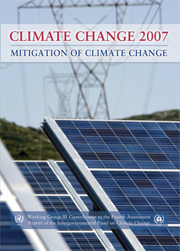 Climate Change 2007 - Mitigation of Climate Change
Climate Change 2007 - Mitigation of Climate Change Book contents
- Frontmatter
- Contents
- Foreword
- Preface
- Summary for Policymakers
- Technical Summary
- 1 Introduction
- 2 Framing issues
- 3 Issues related to mitigation in the long term context
- 4 Energy supply
- 5 Transport and its infrastructure
- 6 Residential and commercial buildings
- 7 Industry
- 8 Agriculture
- 9 Forestry
- 10 Waste management
- 11 Mitigation from a cross sectoral perspective
- 12 Sustainable Development and mitigation
- 13 Policies, instruments and co-operative agreements
- Annex I Glossary
- Annex II Acronyms, abbreviations and chemical compounds
- Annex III List of contributors
- Annex IV List of reviewers
- Index
2 - Framing issues
- Frontmatter
- Contents
- Foreword
- Preface
- Summary for Policymakers
- Technical Summary
- 1 Introduction
- 2 Framing issues
- 3 Issues related to mitigation in the long term context
- 4 Energy supply
- 5 Transport and its infrastructure
- 6 Residential and commercial buildings
- 7 Industry
- 8 Agriculture
- 9 Forestry
- 10 Waste management
- 11 Mitigation from a cross sectoral perspective
- 12 Sustainable Development and mitigation
- 13 Policies, instruments and co-operative agreements
- Annex I Glossary
- Annex II Acronyms, abbreviations and chemical compounds
- Annex III List of contributors
- Annex IV List of reviewers
- Index
Summary
EXECUTIVE SUMMARY
This chapter frames climate change mitigation policies in the context of general development issues and recognizes that there is a two-way relationship between climate change and sustainable development. These relationships create a wide potential for linking climate change and sustainable development policies, and an emerging literature has identified methodological approaches and specific policies that can be used to explore synergies and tradeoffs between climate change and economic, social, and environmental sustainability dimensions.
Decision-making about climate change policies is a very complex and demanding task since there is no single decisionmaker and different stakeholders assign different values to climate change impacts and to the costs and benefits of policy actions. However, many new initiatives emerge from governmental cooperation efforts, the business sector and NGOs (non-governmental organizations), so various coalitions presently play an increasing role. A large number of analytical approaches can be used to support decision-making, and progress has been made both in integrated assessment models, policy dialogues and other decision support tools.
Like most policy-making, climate policy involves trading off risks and uncertainties. Risks and uncertainties have not only natural but also human and social dimensions. They arise from missing, incomplete and imperfect evidence, from voluntary or involuntary limits to information management, from difficulties in incorporating some variables into formal analysis, as well as from the inherently unpredictable elements of complex systems. An increasing international literature considers how the limits of the evidence basis and other sources of uncertainties can be estimated.
- Type
- Chapter
- Information
- Climate Change 2007 - Mitigation of Climate ChangeWorking Group III contribution to the Fourth Assessment Report of the IPCC, pp. 117 - 168Publisher: Cambridge University PressPrint publication year: 2007
- 1
- Cited by


